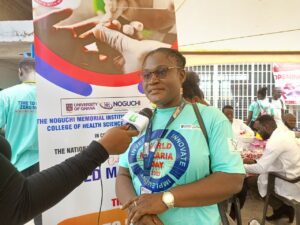90% of Ghanaians have malaria parasite – Noguchi

The Noguchi Memorial Institute for Medical Research (NMIMR) has disclosed that 90 per cent of Ghanaians have malaria parasites and are unaware.
Professor Linda Eva Amoah, Associate Professor of Immunology NMIMR, said this research meant that most adults and children have malaria and were not aware, adding that, the fact that these people are unaware, indicates that they were not treated and serve as a reservoir for transmission.
She made this known in an interview with the Ghana News Agency (GNA) when the NMIMR organised a free malaria screening for traders at Madina in the La Nkwantanang Madina Municipal District.
The screening exercise, which formed part of activities to commemorate the 2023 World Malaria Day, also seeks to create awareness of Malaria and its prevention.
The 2023 World Malaria Day which falls on April 25, is themed: “Time to Deliver Zero Malaria Invest, Innovate, Implement.”
Malaria is a disease caused by a plasmodium parasite, transmitted by the bite of infected mosquitoes. The severity of malaria varies based on the species of Plasmodium.
Symptoms of the disease include fever, headache, vomiting, anemia, sweating, nausea, diarrhea, and muscle pain, usually occurring a few weeks after being bitten.
According to the latest World Malaria Report, there were 247 million cases of malaria in 2021 compared to 245 million cases in 2020. The estimated number of malaria deaths stood at 619 000 in 2021 compared to 625 000 in 2020.
Prof Amoah said malaria remained a key public health concern in Ghana and the global economy and does not only affect children but adults.
In Ghana, 20 per cent of all Out-Patients-Department (OPD) cases are malaria cases, which is a problem because the disease is preventable, and no one should die of malaria.
“So, this exercise is to spread the word and educate more people on malaria prevention, especially parents to make sure they protect themselves and their children.
Creating awareness and providing information is a means by which we can reduce malaria transmission,” she stated.
Prof Amoah said most diseases are presented with symptoms of malaria and thus urged the public to periodically test for malaria when they feel feverish and follow the prescribed course of treatment when positive to ensure that the parasite was cleared.
She said the country was striving towards malaria elimination, “so the message is that not only for persons with symptoms who need to be treated but also includes those with the parasite to prevent spread.
Prof Amoah assured that the outcome of the screening would be shared with the National Malaria Elimination Programme (NMEP) for informed decision-making and interventions.
She called on the public to always protect themselves from mosquito bites by adhering to all the malaria prevention interventions the country had put in place and being more vigilant.
World Malaria Day, marked each year on 25 April, brings together the global malaria community to highlight global efforts to end malaria, the need for sustained political commitment, and continued investment in malaria control and elimination.
Source: GNA
